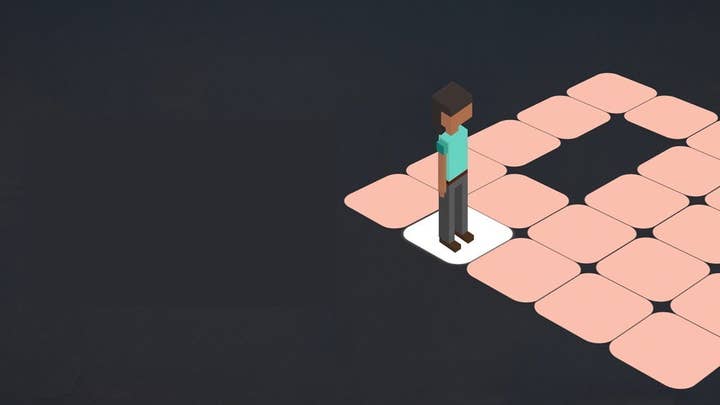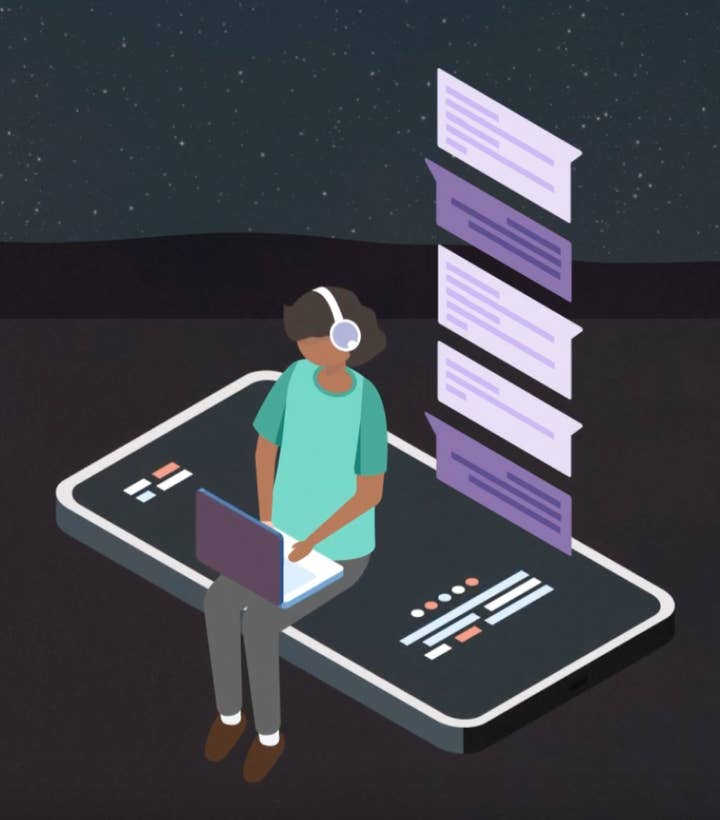Tips from the Games and Online Harassment Hotline on stamping out toxicity in the workplace
Hotline director Jae Lin reflects on the initiative's first year, and share advice on how games professionals on any level can help stop discrimination and harassment
This month marks the one-year anniversary of the Games and Online Harassment Hotline, a US-based support service for anyone suffering from discrimination and harassment in the industry.
The project was started by games critic Anita Sarkeesian, who serves as executive director, and first conceived after the 2019 wave of allegations concerning abuse among games professionals.
Sarkeesian's organisation Feminist Frequency first tested the waters by opening its Twitter DMs to anyone who wanted to share their story and find someone to talk to, then ran a trial for the hotline itself around GDC 2020, offering support to those who had been affected or financially impacted by the event's cancellation.
While data is still being collated as to how many people have used the service, hotline director Jae Lin tells GamesIndustry.biz it has been a big success.

"This past year, we've been supporting folks across a really wide swathe of issues -- everything from in-game harassment to industry workplace environments to more general online harassment and threats, as well as a lot of community conflicts and fallouts," they say. "And tying all of that together as an undercurrent, the general mental health struggles of being in a pandemic, and all of the different things that have happened this past year."
The hotline is staffed by experts and agents who have not only been trained in running such a service -- Lin, for example, has a background in queer community health and wellness, and suicide prevention. But everyone involved is also educated about the specific issues encountered in the games industry, from the games industry's 2019 Me Too moment to 2014's GamerGate.
"One of the really special things about the hotline is that we are specifically for the games community and industry," Lin explains. "So as much as we can have that context for ourselves, for all the agents that answer the calls and texts, it really makes room for folks to not have to explain themselves and allows us to get to the core of what they're going through because we already have the groundwork ourselves."
As the hotline reaches its first anniversary, the games industry has once against been met with a wave of allegations and stories of discrimination, harassment and abuse -- from the biggest AAA publishers like Activision Blizzard and Ubisoft, to indie studio like Fullbright. Fixing the industry's rampant problem with toxicity in a year was never going to be realistic -- nor was it the goal -- but it further demonstrates the need for a service like the hotline.
"The systems in place have been failing survivors for a really long time"
"It kind of feels like clockwork at this point," says Lin of the latest reports. "In a lot of ways, we're so glad that this time around we can be here for people. These are the folks who have been in our minds and in our hearts the whole time we've been wanting to launch this. And I've been feeling so grateful lately for all of our agents and supervisors and everyone that has put so much into the growth of this hotline, because it really felt like we were ready for this. I'm so glad we can be there for people."
It's been well established that toxicity is an industry-wide cultural issue, not the result of a few bad apples. It is high time for the games industry to recognise the roots of this problem and deal with them, rather than reacting to each wave of fresh reports.
More support is needed for those who suffer harassment and discrimination, and the hotline is one of many resources available. GamesIndustry.biz has today published a list of services and sites that can help anyone who feels like they need to reach out but is unsure of where to go.
And those in the US can text SUPPORT to 23368 to contact the Games and Online Harassment Hotline -- all conversations are free, text-based and confidential, with agents available between 3pm and 7pm Pacific Time every day. More information can be found at the hotline's website.
But the issue goes beyond helping the survivors. Lin says the industry needs to look at the bigger picture in order to truly tackle the systemic cultural issues at play.
"I wish the punishment, reporting and shaming systems we have were effective in solving this problem but it clearly hasn't been working," they say. "The systems in place have been failing survivors for a really long time.
"The first step is to truly recognise the harm that's been happening, to stop denying things and saying that these are distorted or false stories. [We need] to really recognise and listen to what's happened. That kind of truth telling and truth reckoning is the first important piece of it, and that's really important to us on the Hotline. That's one of the main things we want to offer, the space for folks to be believed, to come and be heard.
"If we can get to that point, the next steps would be figuring out how to end that harm. Seeing all the different ways that this happened: how did the conditions allow this to happen, and how do we change those conditions to end the harm? Also, how do we make repairs to the people who have been harmed? It isn't enough just to say 'Oh, I see what happened to you was bad, and we're going to try to stop' -- I think it would be really meaningful to figure out ways to listen to the needs of these people and figure out ways to repair it and make things right for what's happened."
To that end, Lin shared advice on the myriad actions and initiatives that can be taken -- not just by company leaders, but by everyone in the industry -- to make workplaces safer and more welcoming for everybody.

Believe people who come forward
You would hope this is obvious, but it is worth emphasising: always take claims of misconduct -- of any form -- seriously, and appreciate how serious they may be for the person impacted. Lin says that many current processes and HR protocols can be traumatising for survivors, as it involves reliving their experience as they share what happened.
"It can be really discouraging, the stigma already makes it so hard to talk about these things," they say. "But I don't think anything else can change unless we not only believe survivors but really shift to a pro-survivor support. Because even when we say we believe survivors, sometimes protocols and systems are set up in ways that really focuses on investigating and ultimately punishing the person that caused the harm, but I don't think that's enough.
"It's not about bad apples, it's the environment and the culture... Stop denying this is the reality for so many people"
"It needs to shift to not only believing survivors, but really supporting them and putting resources into not only punishing the person who harmed but also addressing the needs and healing of the person who was harmed."
This particularly applies to leadership, not just HR or direct managers. The statements we've seen in the past few weeks -- or indeed anytime these stories emerge -- are ones of denial. And that needs to stop.
"[Executives are] not actually looking at the problem," Lin says. "If this isn't the sort of company you want to run, if it isn't in line with your values, you should care more than ever to really listen and look at what's going on. You should make room to believe that this is actually the company you're running, and if it's not what you want it to be, look at what the conditions are that are making this possible and fundamentally change them.
"It's not about bad apples, it's the environment and the culture that is modelling, facilitating, cycling, covering up and perpetuating this violence over and over again for years and years. So step one, really listen and believe. Stop denying this is the reality for so many people."
Understand the complexities
No two incidents are the same, nor are they as black and white as you might believe. This, again, not only emphasises the need to believe those impacted but truly listen to them. For some, sharing their story can be part of the healing process, and it's the nuances of the story that can indicate how complex the incident and the events around it might be.
"The reality of so many of these stories is that it's not as straightforward and simple as [some might think]," Lin explains. "A lot of times, someone who caused your sexual harm is also an idol of yours or someone you really look up to. It might be someone you really care about and love. And that's complicated. That's not going to fit evenly into the mainstream narrative of 'abusers are monsters, let's report them and cancel them, and then that's done'.'
"The more stories we tell, the more room we can make for that complexity. I think that will allow more people to talk about what happened to them, while also making more room for imagination and opportunity for how we can actually meet their needs. Not every survivor's need is for the person who harmed them to get fired or locked up, or even reported and publicly shamed. That isn't what every survivor wants. The more room we can make for imaginative possibilities, the better."
Understand the full spectrum
The increasing numbers of reports emerging over the past few years has also shown the nuances of the cultural issues found across the games industry. And while some incidents are understandably more shocking or traumatising than others, they are not isolated events but ones built on a culture of 'smaller' offences, ones that ultimately enable the more severe cases in the long run.
"It needs to start at a smaller and more personal level, looking at the little interventions we can do on a day-to-day basis to really impact these things"
"It's not just the really extreme cases that involve death or rape," Lin notes. "If we think of rape culture as a pyramid, we have those extreme things at the top, but then we have the verbal harassment and discrimination in the middle, and then at the bottom we have the misogynistic jokes or objectification, or treating people just a little differently because of their gender, race or sexual orientation. That holds this culture up too so it needs to start at a smaller and more personal level, looking at the little interventions we can do on a day-to-day basis to really impact these things.
"A lot of what we're hearing is that, yes, people are experiencing these heightened and escalated forms of harm, but we're also hearing that so many women, so many marginalised people are drowning in the microaggressions of it, the day-to-day stuff."
Lin also calls for more training and reevaluation of how companies and leaders look at harassment in the workplace, especially gender-based violence.
"Sexual assault isn't a stranger waiting in a bush to jump out of the dark. [It's about] having more awareness and understanding of how sexual violence happens, because it's often someone you know, it's complicated when they have power over you, it can look like coercion -- that's a really important thing to change the conversation about, how we 'interrogate and investigate'. Shifting that to something that's a lot more survivor-centred, listening to them, to what happened, and really having conversations rather than interrogations and investigations."
They add that leadership, especially C-level execs, are in a unique position to fully appreciate the full spectrum of discrimination and harassment, and identify what can be done about it.
"How lucky are you to be able to hear all of these stories and look at it with such a big picture [perspective]?" they say. "All these people are gifting us with these stories and we can look at it all as a big picture and see exactly where this is misaligned from the values of a company.
"Lowering the defensiveness, and really seeing this opportunity for what it is to fundamentally change the conditions in which this harm is happening over and over again."
More action than words from leadership
It's hard not to understate how important it is for company leaders to demonstrate how seriously they are taking this issue -- not just talking about it. Plenty of statements made in the past few weeks, even by companies not involved, have made liberal use of phrases such as "decisive action" and "zero tolerance," but simply using those words isn't enough.

"Saying things like 'we have zero tolerance' or 'that's not our values' or 'we don't allow that to happen here' is actually the easy 'getting out of it' sort of card," Lin says. "What's more realistic is starting with that listening and ongoing conversation, and honouring and reckoning stuff. Recognising this is an endemic issue to the games industry. It's almost ubiquitous, part of the culture.
"This kind of toxicity is kind of the air that we breathe. So instead of pretending like we don't have any of that air here, [we should be] really taking a hard look at the spaces that we're in. And instead of assuming 'Well, I don't think that's good, so I don't think that happens here,' say 'This is happening everywhere, I wonder how it shows up here?'"
Look at the patterns of what is happening
Companies, leaders and HR personnel need to not only take each report seriously, but analyse the combination of all the ones they receive. If there are common elements, this can be a good way to identify potential solutions.
Lin offers a prime example: "If alcohol is involved in a lot of the cases going on... Alcohol doesn't cause sexual assault by any means, but it seems to be a common denominator in a lot of these situations. Alcohol does lower your inhibitions, and when you have a culture where misogyny and objectification is normalised, when inhibitions are lowered, it's more likely for that to be escalated into sexual assault."
They emphasise that alcohol is just one example. Look through the reports you receive and search for patterns. What are the conditions allowing these things to happen, and how are they embedded in the company culture? How could you fix this?
Don't stop at fact finding
When dealing with reports of misconduct, it's important to remember the personal and emotional impact of this process. Finding the truth of what happened, and deciding on the appropriate action, is vital of course, but the duty of care goes beyond consequences for the one who caused harm. Listening to the needs of the survivor, including the healing process, is also key.
"Instead of assuming 'Well, I don't think that happens here,' say 'This is happening everywhere, I wonder how it shows up here?'"
"Even if an investigation comes out and the results are [inconclusive], if the protocol ends in that they don't want to pursue further action, I don't think that means we can't still centre the healing around the survivor," says Lin.
"What resources can we give them? Clearly, they're traumatised in some way. Do we give them time off and paid leave? Do we offer them more resources around therapy and healing? Healing looks different for different people. Do we connect them to communities outside of company resources?"
Focusing on this, instead of solely whether punishment is required, can make a big difference to those who are impacted. HR departments, in particular, need to think about how to support survivors after the incident is dealt with.
Educate your staff
There has been a mix of reports over the past few years of companies implementing training programs to deal with toxicity, and employees claiming that these cover the bare minimum and are ultimately dismissed by some staff. Lin says the key is not making training programs and educational efforts a reaction to new reports, but an ongoing conversation.
"Don't just do one little pre-recorded sexual harassment training and then think it's done," they say. "Part of that is that pyramid I was talking about earlier, how rape culture has all of these different levels, is not just about talking to people and saying 'Hey, don't grope your employees'. Yes, that's important, but also talk about what impact those sexist jokes have on a workplace culture. Things like looking not only at the diversity of your workspace, but also the retention of marginalised folks in your workplaces so that people aren't tokenised. Even in the best case scenario where nothing happens to you, being the only woman on your team is so exhausting and draining. It's incredibly isolating."
The fact these issues have occurred so often across the entire breadth of the games industry also shows a need for more leadership training, particularly for lower-level managers that directly oversee the majority of staff at a company.
"One of the things that happens in this industry is folks get promoted into leadership positions without a lot of support for leadership skill development," Lin explains. "That's part of the problem. But if those lower level leaders could be supported in developing more of those conflict mediation skills and how to hold space between people to talk about things that are happening, and really make room and prioritise that when a small incident happens, we actually pay attention to it. We don't wait for things to escalate before we say something."
Smaller interventions can make a big difference
As mentioned, the games industry's cultural issues with discrimination and harassment lie deeper than the most extreme reports that emerge. Lin challenges games companies, especially those in leadership positions, to think about the smaller interventions, the ways you can deal with seemingly less severe incidents that will ultimately improve the culture in your workplace.
"What resources can we give survivors? Do we give them time off and paid leave? Do we offer them more resources around therapy and healing? Healing looks different for different people"
"Maybe not everything is an investigation process," they say. "Maybe if someone comes to you with a lower-level feeling of not being comfortable when all your parties have so much alcohol, or when a certain person doesn't make them feel comfortable, maybe that's not a report or an investigation, but can your HR department equip folks with mediation and facilitation skills to facilitate conversations in the workplace to resolve conflicts before they happen? Having those lower-level interventions could be very powerful."
Those lower-level leaders -- team leads, line managers and so on -- are particularly well positioned to explore this, as they have "more of an ear to the ground when it comes to the day-to-day experiences of the people."
"These are the managers who are going to hear those misogynist or racist jokes, or they might be more aware of groups texts that are gross or problematic," says Lin. "They can intervene and say, 'Hey, why does this exist? Is that something we want? Why might that not be appropriate here?'
"They're really the ones that can make the biggest difference in that day-to-day lower-level intervention and that is going to do so much to prevent it even from getting escalated, which is key."
Everyone plays a part
With low-level interventions in mind, it's worth emphasising that everyone can make an impact when it comes to improving the culture of the games industry -- even if they aren't in any position of power.
"It's not just about telling people 'Hey, don't grope your employees'. What impact do those sexist jokes have on a workplace culture?"
"Talk to each other openly and invite conversations," Lin urges. "For folks who may not be directly experiencing harassment, harm or microaggressions, instead of waiting or relying on directly impacted folks to come out with their stories, think about how we can invite them in. How do I signal that I am open to having conversations about that? How do I signal that I don't believe harassment is okay, that I want my co-workers to feel safe? That I know misogyny is a problem and I want to support my co-workers when it happens?
"Establish those connections, build that trust, and talk to each other really openly about what's going on in the workplace."
They reiterate the need to put the victim first. Rather than leaping to the need to report and punish someone, think about the person who has shared their story, or that you've seen is impacted by something. How can you make them feel safer, comforted and well connected?
And just because you're not in a position of power in the traditional sense -- e.g. a manager or leader -- you may have some power derived from "privilege around systems of oppression."
If you're a white person, a man, straight, cisgender and generelly not in a marginalised group, Lin urges you to "push yourself out of that comfort zone to think about that privilege and how you can leverage it in these conversations."
"It can be really powerful for allies to intervene and say something is not okay, to make it clear homophobia, racism, sexisma and all the microaggressions that appear aren't welcome here," they say.
"Bystander intervention isn't just speaking up and yelling at someone, it's also about taking care of the person, redirecting or distracting someone so that the person impacted can be shielded from that. It can be a whole bunch of different things, but it comes down to paying attention to each other."
Don't forget to read and share our list of resources for anyone suffering harassment and discrimination -- on any level -- in the games industry.
Further advice on how to tackle toxicity can be found on the latest episode of The GamesIndustry.biz Podcast with Splash Damage's Cinzia Musio and Limit Break's Anisa Sanusi. We'll have a full write-up of their advice next week.

